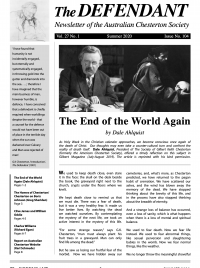I have often wondered what motivates someone to sit down and write an account of another’s life.
To walk in another set of shoes or to get inside the head of another is not an easy task. It is time-consuming. The opportunity costs are there to consider, and today there is significant online competition with websites like Wikipedia.
I find it even more curious when the person’s life being examined is Chesterton, as so many other people have already walked this biographical path. My first reaction on hearing of another Chesterton biography is to wonder if there is something that we’ve all missed. Really! We need another? Was Maisie not enough? Ker, Conlon, Coren? Not enough? Chesterton himself? Not enough? My Chesterton bookshelf can only take so much weight. Do I really need another Chesterton biography?
The simple answer is yes, particularly if it is William Oddie’s Chesterton and the Romance of Orthodoxy. The Making of GKC 1874-1908.
Why has this biography been written?
The first thing to note is that Oddie focuses on only part of Chesterton’s life. Like micro histories that are currently in vogue, he concentrates on the years from Chesterton’s birth until the publication of Orthodoxy. This allows Oddie to focus on Chesterton’s intellectual formation.
It is a biography that seeks to trace the evolution of Chesterton’s thinking and the ideas that have been influential in this evolution. Along the way Oddie is mindful to correct
was driven by a search for the truth. As he once put it, “A Church that tells the truth will always be unpopular because the truth is often highly inconvenient.”
Newman was a religious mentor, as was Pope John Paul II. Yet it was GK Chesterton to whom he felt the closest affinity. He was proud to chair the [UK] Chesterton Society from 2008 to 2016, and wrote in the Herald in 2005, for a series on Great Catholic Britons, that for GKC “Catholic truth was a glittering sword liberating the captives of rationalism and the servile state.”
In physical size, in polemical energy, in his stances on contemporary affairs and in his sheer exuberance for life, Oddie shared many characteristics of his illustrious forebear in Fleet Street.
some misconceptions, including misconceptions that Chesterton himself has propagated, such as denying knowledge of French despite having won a French prize at school. Tracing the evolution of ideas requires significant forensic skills. It is easy while reading Chesterton to fall into the trap of believing that, like Mr. Bean who materializes fully formed, Chesterton has always been confident and certain of his beliefs. This is clearly not the case and Oddie makes this explicit.
Tracing the elements of Chesterton’s intellectual development in the absence of published writing, which only commenced in 1900, requires examination of secondary sources. This is one of the more interesting aspects of Oddie’s biography. We have a detailed analysis of Chesterton’s notebooks along with a more detailed examination of Chesterton’s reading habits. He has read Shelley and Scott and Thackeray and Day. He has read Aytoun and Macaulay, Lytton and Coleridge.
We learn that when his cousin Johannes visited, they talked books – in other words, ideas. We learn of Chesterton’s love of Whitman, but from reading the Canterbury Press edition that left out the carnal poems.
He fell under the sway of Stopford Brooke, Henry Scott Holland, Gore and Noel. He fell under the influence of all the ‘idiotic ambitions’ of the end of the nineteenth century. ‘I did, like all our other solemn little boys, try to be in advance of the age. Like them I tried to be some ten minutes in advance of the truth.’
He read Aquinas and Dickens and Browning and Ruskin. We learn from letters to Oldershaw that Chesterton argued positively for Socialism. He denied for a time the divinity of Christ. He argued for the moral purpose of art and saw in the decadent movement the abyss of nihilism staring him in the face. Tracing intellectual development is not an easy task but Oddie achieves this examination with remarkable precision.
The second thing to note is that because Oddie focused on Chesterton’s early years as a writer we are privy to an examination of some of Chesterton’s major works, including Heretics and Orthodoxy. This alone makes this Oxford University Press edition of Chesterton’s life worth reading. So no – not enough! More please.
